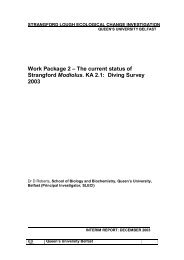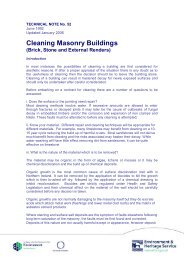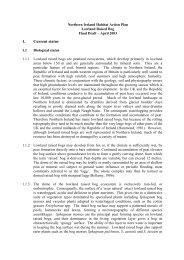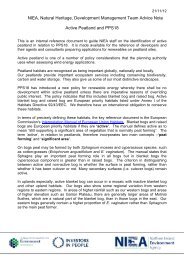Municipal Waste Data Monitoring and Reporting: Interim Guidelines
Municipal Waste Data Monitoring and Reporting: Interim Guidelines
Municipal Waste Data Monitoring and Reporting: Interim Guidelines
You also want an ePaper? Increase the reach of your titles
YUMPU automatically turns print PDFs into web optimized ePapers that Google loves.
frequency that will meet the requirements of the KPIs. The methodology /<br />
frequency should be clearly documented <strong>and</strong> transparent.<br />
3.5.3 Develop a <strong>Data</strong>base<br />
An important factor for the collation of waste statistics is that they are readily<br />
available <strong>and</strong> intelligible.<br />
Having defined how data are to be measured <strong>and</strong> recorded, the next step is to<br />
develop a database for storing the data <strong>and</strong> calculating KPIs. The best format<br />
for this is a computer database. This computer database should be capable of:<br />
• interrogation for regular reporting cycles; <strong>and</strong><br />
• interrogation to provide other information that may not be linked to<br />
the reporting cycle.<br />
A well-designed computer database will also allow different users to obtain<br />
the specific information they need. It will also further improve the efficiency<br />
of data systems by enabling quick <strong>and</strong> accurate importing, processing <strong>and</strong><br />
reporting of data.<br />
The format of the database should be compatible with the Department’s<br />
software systems (i.e. Microsoft Office Excel). The database should be<br />
designed to facilitate the regular recording of data <strong>and</strong> also enhance the<br />
calculation of KPIs. Microsoft Excel worksheets for input of relevant waste<br />
data have been developed for use by the District Councils <strong>and</strong> <strong>Waste</strong><br />
Management Groups (see Section 3.7 below).<br />
In conformance with UK – wide reporting proposals, the Department intends<br />
to introduce the m<strong>and</strong>atory use of electronic reporting of data after a<br />
transition period. The timing <strong>and</strong> transition arrangements for this policy will<br />
be subject to consultation with District Councils <strong>and</strong> industry.<br />
3.5.4 <strong>Data</strong> collection <strong>and</strong> validation<br />
Once the procedures described above have been implemented, the next step is<br />
the actual operation of the monitoring <strong>and</strong> reporting system.<br />
As data are collected <strong>and</strong> fed into the database, they should be validated <strong>and</strong><br />
checked for accuracy. Validation should involve crosschecking the data with<br />
previous figures to check for consistency, making sure that the figures being<br />
generated are realistic <strong>and</strong> relate to the appropriate activity. This validation<br />
exercise should also include r<strong>and</strong>om spot checks on the entries into data<br />
recording forms.<br />
In accordance with statutory reporting requirements in due course, the Department<br />
will commission <strong>and</strong> undertake independent audits of reported data from District<br />
Councils.<br />
MUNICIPAL WASTE DATA MONITORING AND REPORTING: INTERIM GUIDELINES 9

















